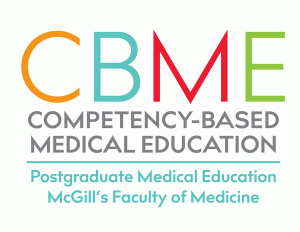Message sent on behalf of VP-Dean Eidelman:
As you are aware, a new approach to postgraduate medical education called Competency-Based Medical Education (CBME) is being adopted worldwide. Other professions are also implementing similar approaches. In 2013, the Royal College of Physicians and Surgeons of Canada began developing the Canadian version of CBME called Competency by Design (CBD) for its specialty programs.
In 2017, McGill and Canada’s 16 other postgraduate medical education (PGME) offices started introducing CBD. Dr. Evelyn Constantin, McGill’s Assistant Dean, PGME, and her team, reporting to Dr. Armand Aalamian, Associate Dean, PGME, are leading the implementation at McGill.
Canada’s Family Medicine residency programs were early adopters, successfully implementing a similar approach, known as the “Triple C” curriculum, as early as 2008.
McGill is committed to CBME. To date, eight McGill PGME programs have introduced the new approach, with another 12 programs starting the transition on July 1, 2019. The rest of our Royal College specialty programs will roll it out over the next few years.
CBME will build on the excellence, mentorship and coaching for which our clinician-teachers are recognized. We know transitioning to this new assessment framework is no small task, for neither the PGME Office nor your residency program, department, faculty members and residents. The PGME Education Team is there to support you, as described below.
In Canada, residency training is among the best in the world. However, medical knowledge and technology are expanding exponentially, and residency training has to keep pace and evolve in order to continue excelling. This is where CBME comes in.
CBME is a major step forward in formative assessment. Each residency program works with the Royal College to develop its unique set of training and assessment requirements – called Entrustable Professional Activities (EPAs). Each EPA includes CanMEDS-based milestones related to different stages of training. The EPAs and milestones lay out a clear learning plan for residents and provide well-defined teaching and assessment goals for educators.
Under the CBME model, clinician-teachers directly, deliberately and frequently observe residents, providing them with feedback and coaching. The goal is to help residents acquire their competencies to ensure they can be entrusted for each EPA. Clinician-teachers record their observations and assessments, which inform decisions about a resident’s readiness for promotion to the next stage of training.
CBME Implementation and Support
A significant amount of work goes into planning for and implementing CBME. At McGill, PGME’s Education Team provides support organizing a variety of faculty development initiatives: retreats, workshops, grand rounds, simulation sessions, one-on-one consultations, curriculum mapping and planning sessions. The Education Team also meets and consults regularly with residents as well as members of the Association of Residents of McGill to ensure their ideas and suggestions are taken into account.
The PGME Education Team has created and assembled a variety of teaching and learning materials that each program can adapt, which you can access on the PGME website at any time.
Thank you, in advance, to everyone involved in our clinical settings for ensuring this essential training and assessment program is successfully rolled out in your residency program and department. Thank you to those who have implemented CBME for being trailblazers and sharing your knowledge and advice with your colleagues. I also take this opportunity to thank Evelyn, the PGME Education Team and Armand for their tremendous dedication to the implementation of CBME at McGill.
Should you have questions about the implementation of CBME, please do not hesitate to contact the Postgraduate Medical Education Office at: pg-education.med@mcgill.ca.
Vice-Principal (Health Affairs),
Dean of the Faculty of Medicine
May 30, 2019


